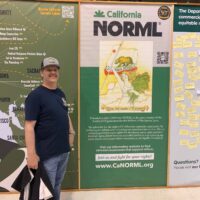UPDATE 5/31/16 – The bill has failed to win approval in the Assembly Appropriations committee.
Thanks to all the NORML supporters who wrote to their legislators against this bill. NORML’s online alert generated the following:
Unique Supporters Taking Action: 963
Total Actions Taken: 1267
Total Letters Sent: 1318
UPDATE 6/10/2016: AAA Study: No scientific basis for laws on marijuana and driving.

L to R: Former NIDA researcher Marilyn Huestis, Santa Clara DA Jeff Rosen, Asm. Evan Low
SACRAMENTO, April 19 – Today in the Assembly Public Safety Committee, AB 2740 (Low, Lackey) passed by a 4-2 vote, despite objections from activists and science on our side. The bill would establish a 5 ng/ml per se standard for THC, criminalizing drivers with that amount in their blood (though supposedly other indicators of impairment would be necessary for a conviction).
The bill was pushed by Santa Clara DA Jeff Rosen, whose office footed the bill to fly in researcher Marilyn Huestis,* who has made a career from finding fault with drivers who use marijuana, to testify in favor of the measure. Committee chair Reggie Jones-Sawyer kept Huestis’s testimony to a minimum, but Assemblyman Lackey (R-Palmdale), who spoke about having a “personal marijuana tragedy,” gave her more time in the question-and-answer period. Opposition testimony limited to 1-2 minutes was taken from NORML and other advocates. DPA, ACLU, and the Public Defenders’ Association rose in opposition to the bill, while District Attorneys (state and LA) spoke in favor.
Voting in favor of the bill were its sponsors, Lackey and Evan Low (D-San Jose), a LGBT activist. Possibly answering NORML’s assertion that the bill would criminalize AIDS patients, cancer patients, and other seriously ill medical marijuana users, since chronic users can show 5 ng/ml in the blood for days after use, Low said that he didn’t want to infringe on patients’ rights but that he thought the bill was necessary for public safety.
Huestis spoke about finding increased prevalence of marijuana in drivers post legalization (which doesn’t mean they are causing more accidents), and said that marijuana-using drivers were twice as likely to have accidents as non-using drivers. Ellen Komp from California NORML pointed out that the same increased accident rate is true for having three people in a car, and at the legal limit of 0.08 BAC, drivers using alcohol were 6-7 times more likely to have accidents than those who did not drink. Under questioning from Lackey, Huestis then asserted that her latest study using the “world’s most advanced driving simulator” found that at the proposed threshold of 5 ng/ml of THC in the blood, the increased incidence of traffic fatalities was by a factor of 6.8.
Chair Jones-Sawyer then spoke, asking his colleagues to vote against the bill, since AB 266 had a provision for research on the topic, $1.8 has just been awarded to USCD to study the matter, and the results from that study are not yet in. He noted that since drug laws are disproportionately enforced against blacks and Latinos, they were likely to be targeted and punished under the bill.
The vote then went 3-2, with committee members Lackey, Low and Patty Lopez (D-San Fernando) voting in favor; Jones-Sawyer and Bill Quirk (D-Hayward) in opposition; and vice chair Melissa Melendez (R-Murietta) abstaining. It remained for Asm. Miguel Santiago (D-Los Angeles), who was absent for the hearing, to return to the chamber and cast his vote, since 4 votes are needed to pass the bill on. Asm. Low took a seat beside Santiago and coached him to vote yes on the measure, despite his being asked three times if he knew what he was voting on.
The bill now moves to the Assembly Appropriations committee.
Another bill, SB 1462 (Huff), allowing for oral swab testing for THC, passed the Senate Public Safety Committee today and will head to Senate Appropriations. Voting in favor of the bill were Senators Joel Anderson (R-Escondido), Steve Glazer (R-Livermore), Mark Leno (D-SF) and Jeff Stone (R-Indio). The sole dissenting vote was from Senator Loni Hancock (D-Oakland). Not voting were Senators Carol Liu (D-Glendale) and Bill Monning (D-Santa Cruz).
Please contact members of the Public Safety committee who voted in favor of this measure to express your disapproval. Also, if you live in the district of members of the Appropriations committee, please call them to ask that they vote against this costly and needless measure.
ASSEMBLY PUBLIC SAFETY MEMBERS WHO VOTED YES ON AB 2740:
Evan Low (D-Cupertino) (916) 319-2028 (bill co-sponsor)
Tom Lackey (R-Palmdale) (916) 319-2036 (bill co-sponsor)
Patty Lopez (D-San Fernando) (916) 319-2039
Miguel Santiago (D-Los Angeles) (916) 319-2053
ASSEMBLY APPROPRIATIONS COMMITTEE MEMBERS:
Lorena Gonzalez (D-Chula Vista) Chair
Frank Bigelow (R-Madera, Placerville) (Vice Chair) (916) 319-2005
Richard Bloom (D-Santa Monica/Malibu) (916) 319-2050
Susan Bonilla (D-Concord) (916) 319-2014
Rob Bonta (D-Oakland, Alameda, San Leandro) (916) 319-2018
Ian Calderon (D-City of Industry) (916) 319-2057
Ling Ling Chang (R-Brea) (916) 319-2055
Tom Daly (D-Santa Ana, Anaheim) (916) 319-2069
Susan Eggman (D-Stockton) (916) 319-2013
James Gallagher (R-Chico, Yuba City) (916) 319-2003
Eduardo Garcia (D-Imperial) (916) 319-2056
Roger Hernandez (D-Azusa) (916) 319-2048
Chris Holden (D-Pasadena) (916) 319-2041
Jay Obernolte (R-Hesperia) (916) 319-2033
Bill Quirk (D-Hayward) (916) 319-2020
Miguel Santiago (D-Los Angeles) (916) 319-2053
Donald Wagner (R-Tustin) (916) 319-2068
Don’t know who your Rep is? Click here.
Take action on this bill
Download a flyer about this bill.
NORML got late notice on the proposal, which was a gut-and-amend from a human trafficking bill.
Cal NORML’s testimony:
On behalf of our members, we oppose AB 2740.
The presence of low levels of THC in blood is an inappropriate and inconsistent indicator of psychomotor impairment. So says the United States Traffic Highway Safety Administration (NHTSA) in documents I have copies of here. Recent studies from NHTSA and others show that marijuana is far less dangerous than alcohol when used in legal amounts. Marijuana increases crash risk by a factor of 1.26-2, comparable to having three people in the car; alcohol at the legal limit increases accident risk by a factor of 6-7.
A study from 2015 found that levels above 5 ng/ml were detected as long as 4 days after use in heavy smokers. (Odell et al.) Therefore, AB 2740 would criminalize AIDS patients, cancer patients, and other seriously ill Californians who use legal medical marijuana with a doctor’s recommendation.
Cal NORML is certainly in favor of road safety and we advance public education and impairment testing, rather than arbitrary drug tests, to accomplish this goal.
Sources:
https://www.canorml.org/healthfacts/drugtestguide/drugtestdetection.html#accidents
https://www.canorml.org/health/driving_info
Read NORML deputy director Paul Armentano’s letter to the committee.
*Huestis, BTW, retired from NIDA at the end of January. Her last paper on the way out says:
“Researchers reported that cannabis administration was associated with compensatory driving behavior, such as decreased mean speed and increased mean following distance, whereas alcohol administration was associated with faster driving. Investigators also reported that cannabis dosing in combination with low quantities of alcohol ‘mitigated drivers’ tendency to drive faster with alcohol’ – a finding that contrasts with prior data acknowledging that the two substances combined typically possess an additive adverse effect
“THC concentration-dependent associations with decreased speed, increased time below the speed limit and increased following distance suggest possible awareness by drivers of potential impairment and attempts to compensate,” authors concluded. “The compensatory behavior exhibited by cannabis-influenced drivers distinctly contrasts with an alcohol-induced higher risk behavior, evidenced by greater percent speed.”
NORML deputy director Paul Armentano said, “Marilyn appears to publicly support imposing per se THC limits (though not limits for carboxy THC) even though her own research would not seem to support such a policy. I’m quite familiar with her papers and cite them frequently because they are not supportive of such action.”
Other quotes from her research:
Schwope/Huestis:
“No significant differences were observed for critical-tracking or divided-attention task performance in this cohort of heavy, chronic cannabis smokers.”
Huestis/Hartman
“Increased blood THC concentrations are strongly associated with increased crash risk, but there is no direct correlation between driving impairment and THC concentration.”
The day after the hearing, it was announced that Huestis is now a scientific advisor for Cannabix Technologies, a company working on developing a breathalyzer test for THC.



